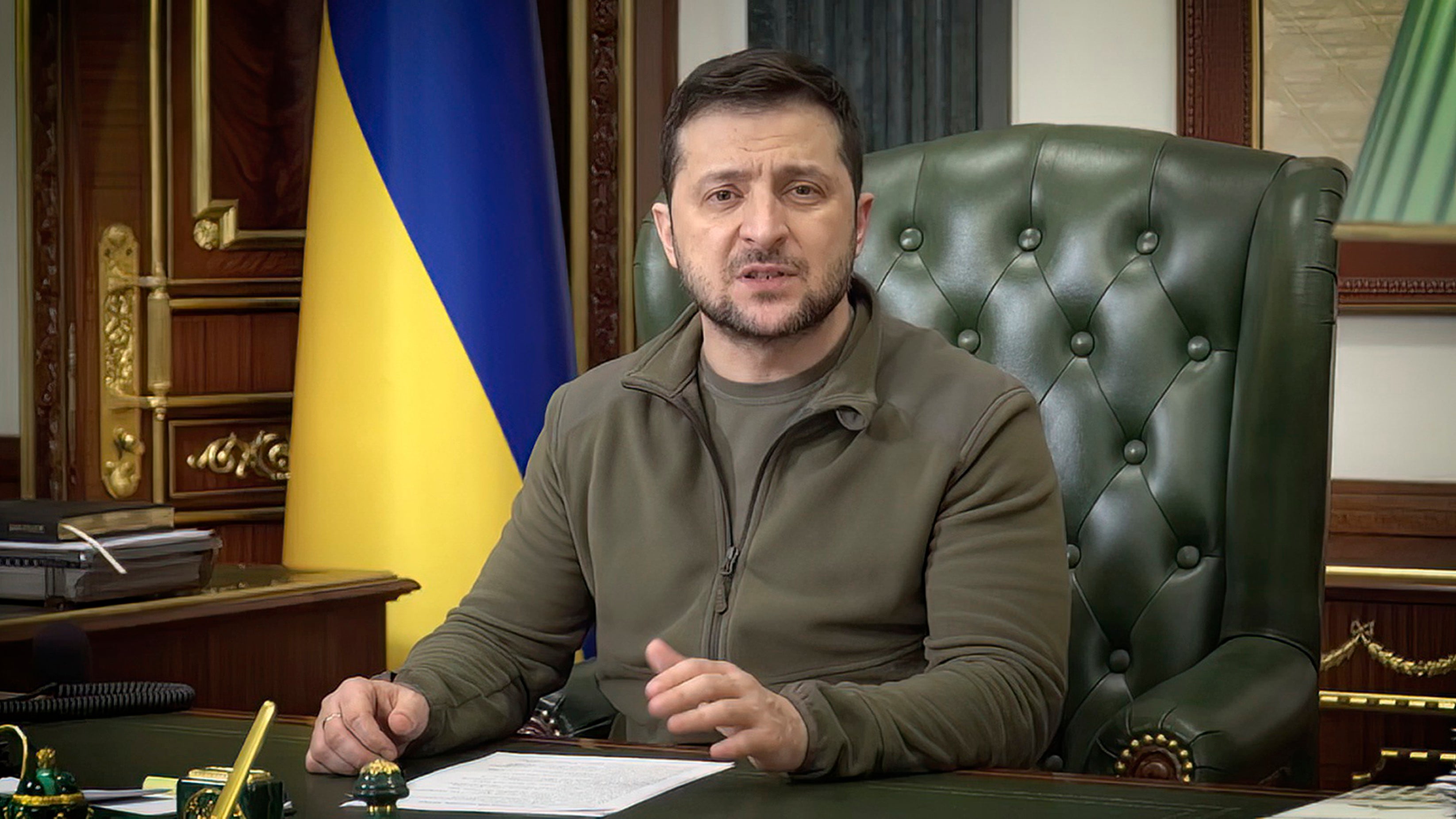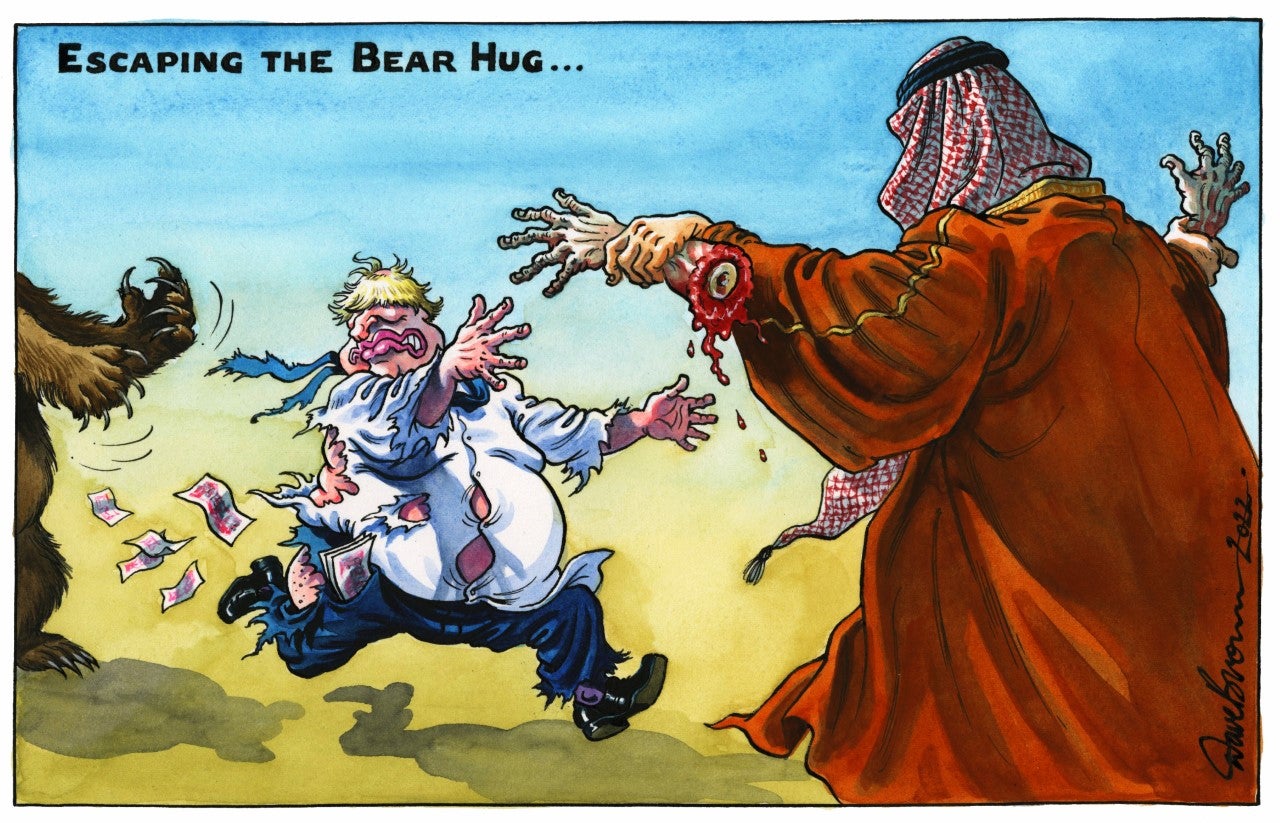Inside Politics: Ukraine must accept it will not join Nato, Zelensky says
Ukraine president offers what appears to be first major concession to Russia ahead of further round of peace talks, writes Matt Mathers


Today’s Independent editorial cartoon, ‘Escaping the bear hug’ (below), perfectly encapsulates the dilemma faced by Boris Johnson, who is in Saudia Arabia “cap in hand”, asking the crown prince, Mohammed bin Salman (MBS), to pump more oil to ease pressure on supplies and thus bring down fuel prices for consumers in the UK and elsewhere. In his efforts to offset the loss of oil from Vladimir Putin’s Russia amid the Ukraine crisis, the prime minister is turning from one authoritarian leader accused of being implicated in murder to... well, another authoritarian leader allegedly implicated in murder.
Since the war broke out, commentators have said time and again that there are varying levels of morality to consider when trying to solve a crisis. As prime minister, Boris Johnson’s first priority is ensuring the security and prosperity of citizens here in the UK, so it seems only right that he remains pragmatic in exploring all avenues when trying to reduce the cost of oil when Britons are finding it increasingly difficult to fill their cars up with petrol and struggling to heat their homes. That’s a particular problem in Northern Ireland, where a majority of families rely on heating oil due to the country’s outdated infrastructure.
While all the signs suggest Johnson’s overtures on behalf of the UK and the west are likely to be rejected (Saudi Arabia and the UAE – which the PM also visits today – are bound by rules determined by the wider OPEC oil cartel), the mere fact that he is attempting to switch energy reliance away from Putin’s kleptocracy to MBS’s autocracy in a time of global insecurity only serves to further underline the importance of speeding up our transition away from fossil fuels. Failing to embrace renewable energy leaves us open to the whims of states whose interests are often diametrically opposed to our own, not to mention further imperilling the climate.
Inside the bubble
Politics commentator Andrew Grice on what to look out for:
With Boris Johnson on an oil mission in the Middle East, prime minister’s questions will be a battle of the deputies between Dominic Raab and Angela Rayner. Kevin Foster, the immigration minister, can expect some tough questions from the home affairs select committee about the government’s response to the Ukraine refugee crisis. Defence Secretary Ben Wallace will travel to Brussels for a meeting of Nato defence ministers.
Coming up:
– Foreign secretary Liz Truss on BBC Breakfast at 7.30am
– Shadow economic secretary to the Treasury Tulip Siddiq on LBC at 8.20am
Daily Briefing
- CONCESSION: Volodymyr Zelensky, the Ukraine president, said yesterday that his country must accept that it will never join Nato in what appeared to be a first major concession to Russia as Putin’s bombs continued to rain down on targets across the country, including in the capital Kyiv, where attacks intensified with residential buildings and a subway station targeted. Speaking to military officials of the UK-led Joint Expeditionary Force in a video message on Tuesday, Zelensky, who has won plaudits around the world for his conduct during the war, said it was a “truth” that his country would not join the military alliance. “Ukraine is not a member of Nato. We understand that. We have heard for years that the doors were open, but we also heard that we could not join. It’s a truth and it must be recognised,” he said. Putin’s intentions in the war are disputed, although in announcing his invasion on 24 February, he again repeated what he described as security concerns about Ukraine, saying Russia could not feel “safe, develop and exist” due to the alleged threat from its Slavic neighbour. Another round of peace talks are scheduled to take place later today and the mood surrounding the discussions is again more upbeat than in previous weeks. Zelensky himself said has said the peace talks are “more realistic” but that more time is needed. Nato’s defence ministers meet in Brussels later for the first time since the war started to discuss what more can be done to help Ukraine, although a no fly zone remains off the table. We’ll have all the latest updates on our liveblog.
FRESH SANCTIONS: The UK continues to tighten the economic screws on Putin and the oligarchs linked to his Kremlin regime. His prime minister and defence minister were among some 370 super-rich Russians hit in a fourth round of sanctions announced by the Foreign Office, which has been able to ramp up its targeting of individual oligarchs following the passing of the Economic Crime Act on Monday. “We are going further and faster than ever in hitting those closest to Putin – from major oligarchs, to his prime minister, and the propagandists who peddle his lies and disinformation,” Liz Truss said. “We are holding them to account for their complicity in Russia’s crimes in Ukraine. Working closely with our allies, we will keep increasing the pressure on Putin and cut off funding for the Russian war machine.” The Labour Party welcomed the fresh round of financial penalties and urged ministers to ensure there are no loopholes for oligarchs to escape the sanctions. “Urgent sanctions have been needed so that Putin and his inner circle cannot live a Mayfair lifestyle in Moscow while committing atrocities in Ukraine,” Nick Thomas-Symonds, the shadow international trade secretary, said. “The government now needs to ensure that the export ban has no loopholes so it has maximum impact.”
- MIDDLE EAST TRIP: Johnson’s one day trip to the Middle East includes a visit to the United Arab Emirates and he arrived in Abu Dhabi in the early hours of the morning. He will meet with leaders there and in Riyadh and is scheduled to have talks with Mohammed bin Zayed, the crown prince, before going on to Saudi Arabia to see its crown prince, MBS. Downing Street said the visit is to “ensure coordinated international action on Russia’s illegal invasion of Ukraine” and to “discuss energy security in the region”. His visit to Saudi Arabia comes just days after the kingdom executed 81 people in the largest mass imposition of the death penalty for many years. Downing Street said the PM will raise human rights and the UK’s opposition to capital punishment with the kingdom’s de facto ruler, but declined to say whether Johnson will raise the murder of journalist Jamal Khashoggi, in which “MBS” is widely alleged to have been implicated. Confronted by a Sky News interviewer over whether he was seeking support from “unpleasant” countries like Saudi and Iran in order to counter the threat from Putin, Johnson insisted it was necessary to “build the widest possible coalition”. Keir Starmer, the Labour leader, accused Johnson of “going cap in hand from dictator to dictator” to seek alternative oil supplies, although he stopped short of saying he would not do the same. “Obviously there’s a real energy crisis in terms of the cost at the moment, so anything that brings the cost down now is a step in the right direction, whatever it is,” he said. “But going cap in hand from dictator to dictator is not an energy strategy”.
- HOPE FOR NAZANIN: Talks over the case of Nazanin Zaghari-Ratcliffe are at a “delicate” stage, the PM said yesterday after the detained British-Iranian mother had her passport returned by Iranian authorities. The move had sparked hopes that Zaghari-Ratcliffe might finally be released – but Johnson declined to comment in detail, saying he did not want to “tempt fate.” Her lawyer, Hojjat Kermani, told Reuters: “I am hopeful that we will have good news soon.” Zaghari-Ratcliffe has been detained in Iran since 2016 when she was arrested on charges of plotting to overthrow the government, which she has always denied.
- BREXIT FESTIVAL: The PM’s planned “Festival of Brexit” is a waste of public money and set for failure, a committee of MPs has warned. In a scathing report the cross party-culture media and sport select committee criticised the government’s handling of the £120 million project – which is set to take place this year. The event is now officially known as “Unboxed: Creativity in the UK” but government figures including Brexit opportunities minister Jacob Rees-Mogg have characterised it a “festival of Brexit”. MPs say they were told that the event’s final name could not be chosen before October 2021, less than a year before it was due to take place, because ministers “did not know what it was”.

On the record
“Ukraine is not a member of Nato. We understand that. We have heard for years that the doors were open, but we also heard that we could not join. It’s a truth and it must be recognised.”
Zelenksy offers apparent concession to Russia.
From the Twitterati
“Today we have passed another terrible milestone: three million refugees have fled from Ukraine. The war has to stop. Now.”
UN high commissioner for refugees, Filippo Grandi.
Essential reading
- John Rentoul, The Independent: Boris Johnson’s visit to Saudi Arabia is a trip too far
- Hamish McRae, The Independent: War in Ukraine will affect food prices – the real question is how badly
- Joyce Fegan, The Independent: A hundred thousand welcomes – how Ireland has embraced Ukrainians fleeing war
- Sebastian Payne, The Financial Times: Conservatives hope May’s local elections will bolster their ‘red wall’
Sign up here to receive this free briefing in your email inbox each weekday






Join our commenting forum
Join thought-provoking conversations, follow other Independent readers and see their replies
Comments